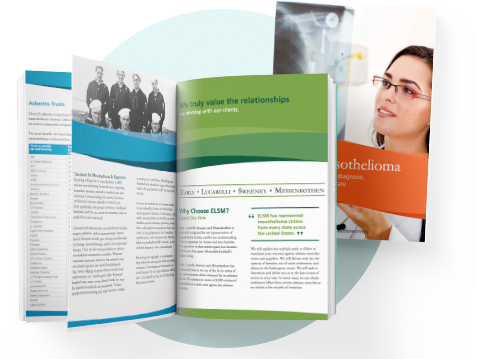Mesothelioma and Railroad Workers
Railroad workers have been exposed to dangerous substances, with asbestos being one of the most common. Asbestos was widely used in the railroad industry because it could resist heat. Workers often found asbestos in insulation, brake pads, gaskets, and other parts of locomotives and railcars. When these parts wear down or are cut, dangerous fibers are released into the air, putting workers at risk. Breathing in these fibers can cause mesothelioma, a rare and aggressive cancer linked to asbestos.
Workers diagnosed with mesothelioma or other asbestos-related diseases like lung cancer can seek compensation. They may file railroad asbestos claims, such as personal injury claims, asbestos trust fund claims or wrongful death lawsuits.
Asbestos Exposure for Railroad Workers

Studies show that railroad workers exposed to asbestos in railroad equipment and buildings are at greater risk of developing mesothelioma. Before the switch from steam to diesel trains in the 1950s, railroad asbestos exposure was common among workers, especially those repairing and maintaining steam engines.
A 1987 study by the Department of Medicine, Brigham and Women's Hospital in Massachusetts, found that older railroad workers, particularly those who worked with steam locomotives, are at high risk for asbestos exposure, even if they no longer work with it directly.
A 2015 study from the British Medical Journal found that railroad workers exposed to asbestos are 3-4 times more likely to die from mesothelioma compared to the general population.
For decades, asbestos was commonly found in areas with high heat, friction or heavy use, including:
- Locomotives: boilers, brake pads, brake linings, valves, gaskets
- Rail yards: cement railroad ties, blacksmith shops, car repair yards
- Train cars: box cars, cabooses, passenger cars
By the 1980s, railroads stopped using products that had asbestos. Many companies took steps to remove or seal asbestos through abatement. However, not all asbestos was removed so it is still a danger to railroad workers today.
At-Risk Trades Within the Railroad Industry
The most common way railroad workers are exposed to asbestos is on the job. In the railroad industry, the risk of a mesothelioma diagnosis may be higher than in many other jobs.
Railroad workers that face the greatest risk of asbestos exposure include:
- Brakemen
- Conductors
- Equipment operators
- Foremen
- Locomotive engineer
- Machinists
- Pipefitters
- Rail yard supervisor
- Railroad Carmen
- Signal Operators
- Station masters
- Steam engine worker
- Switch operators
- Track laborers
- Welders
- Yardmasters
Asbestos Products Used by Railroad Workers
Railroad workers may be exposed to asbestos in trains, buildings and equipment. Asbestos was primarily used for insulation and fireproofing materials, making it useful for many products. For example, asbestos in train brakes, such as in the brake pads and linings, was used for its heat resistance.
Common asbestos-containing products produced before the 1980s:
- Boilers
- Brake linings
- Brake pads
- Ceiling tiles
- Cement ties
- Clutches
- Floor tiles
- Gaskets
- Insulation
- Plaster
- Rail ties
- Rope
- Sealing cement
- Steam Engines
- Transit boards
- Wallboards
Railroad Companies That Used Asbestos
Many companies that made or used asbestos products put railroad workers at risk. Johns Manville, The Flintkote Company and General Motors are examples of companies that supplied asbestos materials to railroad companies.
Railroad companies that used asbestos include, but are not limited to, the following:
- Amtrak
- Atchison, Topeka and Santa Fe Railway
- Birmingham Southern Railroad
- BNSF Railway
- Burlington Northern Railroad
- Chesapeake and Ohio Railway
- Chicago and North Western Railroad
- Delaware, Lackawanna and Western Railroad
- Erie Lackawanna Railroad
- Kansas City Southern Railway
- Long Island Rail Road (LIRR)
- MTA Metro-North Commuter Railroad
- Pennsylvania Railroad
- Railroad Friction Products Corporation
- Southern Pacific Railroad
- Union Pacific Railroad
If you worked for a company that used asbestos, it’s important to see a doctor, even if you don't have any symptoms. Tell your doctor about your asbestos exposure so they can monitor your health. Symptoms of asbestos-related illnesses can take 10-50 years to appear.
Railroad Workers & Secondhand Asbestos Exposure
Railroad workers can bring asbestos fibers home on their clothing. These fibers can settle on clothes and other surfaces, putting family members at risk of secondhand exposure when they breathe them in.

A complete guide delivered next day to your doorstep. Treatment Information, top doctors & cancer centers, financial assistance and more.
Compensation for Railroad Workers With Mesothelioma
If you were exposed to asbestos while working on trains, tracks, or stations and were diagnosed with mesothelioma, you have legal rights to seek compensation. A mesothelioma lawyer from Early, Lucarelli, Sweeney and Meisenkothen (ELSM), can help evaluate which railroad asbestos claims best suit your situation. Filing these claims holds railroad companies or manufacturers responsible for their harmful practices.
Filing options for mesothelioma claims include:
- Personal Injury lawsuit
- Wrongful death lawsuit
- Asbestos trust fund claims
- Federal Employers' Liability Act claim
Mesothelioma Lawsuits
Railroad workers exposed to asbestos on the job who develop a related disease may be eligible to file a mesothelioma lawsuit. Compensation received from asbestos claims can help cover the costs of mesothelioma treatment, lost wages and other expenses.
A railroad worker’s cancer lawsuit may result in either a settlement or a verdict. A settlement is reached outside of court between the victim and the company being sued, while a verdict is determined by a jury. ELSM has won millions for clients, including a $2.3 million settlement for a New York railroad worker exposed to asbestos while working as a trackman, welder and driver.
If your loved one passed away from an asbestos-related illness, an asbestos lawyer can file a wrongful death lawsuit on behalf of your family or the deceased's estate.
It’s important to hire an asbestos law firm, who specializes in mesothelioma cases. At Early, Lucarelli, Sweeney and Meisenkothen, we’ll review all legal options based on your specific situation. We have an established record in handling mesothelioma railroad worker cases.
Asbestos Trust Funds
There are over 60 active asbestos trust funds, with more than $30 billion set aside to compensate current and future victims of asbestos-related diseases, such as mesothelioma. These trust funds were created by companies that manufactured asbestos-containing products and went bankrupt after facing lawsuits over asbestos-related illnesses.
Workers who were exposed to asbestos on the job and have been diagnosed with mesothelioma can file railroad asbestos claims to access these bankruptcy trust funds. ELSM had decades of experience handling asbestos trust funds. We will evaluate your situation, determine eligibility and gather the medical and exposure documentation necessary to file an asbestos trust fund claim.
Federal Employers Liability Act (FELA)
The Federal Employers' Liability Act was passed by Congress to address the serious dangers and high injury and death rates in the railroad industry. It not only aims to promote safer working conditions, but it allows railroad workers to seek compensation from their employer if they develop diseases like mesothelioma from asbestos exposure at work. Railroad asbestos claims help workers diagnosed with mesothelioma pay for medical bills, lost wages and pain and suffering. Railroad asbestos exposure has been a danger for many years, and FELA holds railroad companies responsible for not keeping workers safe. This law is important for mesothelioma railroad workers who need help after being exposed to harmful asbestos.
The Federal Employer’s Liability Act (FELA) is a federal law designed specifically to compensate past and present railroad workers for work-related injury or illness, including lung cancer and mesothelioma. It is the railroad worker's equivalent of worker’s compensation, except damages are uncapped under FELA, unlike under normal worker’s compensation.Brian Early,
Managing Partner and Mesothelioma Lawyer
FELA applies to railroad workers, but not all railroad companies are covered under the act. ELSM can help mesothelioma victims determine their eligibility for FELA claims and help with filing.
Legal Support for Railroad Workers
Railroad workers faced asbestos exposure while maintaining trains, tracks and stations, especially before the 1980s. Health effects from this exposure may take decades to appear but can be life-changing.
It's essential for railroad workers with mesothelioma to work with a law firm experienced in handling railroad cancer lawsuits. A knowledgeable lawyer will build a strong case and help hold asbestos manufacturers and railroad companies accountable for their negligence in exposing workers to harmful asbestos.
If you or a loved one has been affected by mesothelioma due to railroad asbestos exposure, contact ELSM today for a free case evaluation. Our team has decades of experience handling railroad asbestos settlements. We are committed to fighting for the compensation you deserve.
FAQs
Are railroad workers still at risk for developing mesothelioma?
Yes, railroad workers are still at risk for mesothelioma due to asbestos exposure, even though its use in the industry has declined since the 1980s. Many older railroad cars, locomotives, equipment and buildings still have asbestos. When these materials are disturbed during repairs or maintenance, asbestos fibers can become airborne and inhaled.
Railroad workers exposed to asbestos through the 1970s are still at risk for developing mesothelioma due to the disease’s long latency period. Additionally, their families may face secondhand exposure if asbestos fibers are carried home on clothing. While the risk has gone down, mesothelioma is still a concern for some railroad workers.
Request a Free Case Evaluation
Request a free case evaluation now if you or someone you love has been diagnosed with mesothelioma. The evaluation will cost you nothing. Our lawyers will travel to visit you at your convenience or conference call with you over the phone. We understand how difficult a time this is for you and will assist in any way that we can. You can also call us toll-free at 1-800-336-0086 at any time.
Sources
- Brotherhood of Railroad Signalmen. About the Federal Employers’ Liability Act.
- Garshick E, Schenker MB, Woskie SR, Speizer FE. Past exposure to asbestos among active railroad workers. Am J Ind Med. 1987;12(4):399–406.
- U.S. Bureau of Labor Statistics. OCCUPATIONAL OUTLOOK HANDBOOK: Railroad Workers.
- Van den Borre L, Deboosere P. Enduring health effects of asbestos use in Belgian industries: a record-linked cohort study of cause-specific mortality (2001-2009). BMJ Open. 2015 Jun 24;5(6):e007384.




